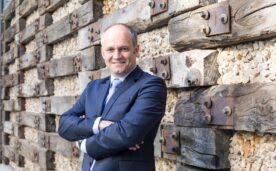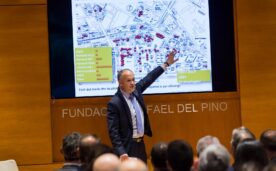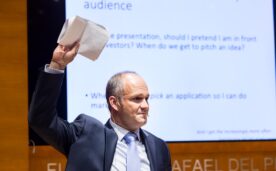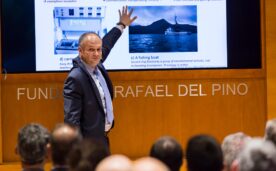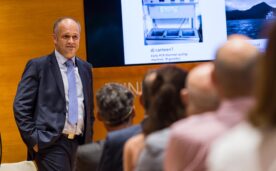On 3 May 2017, the Rafael del Pino Foundation organised the Keynote Lecture "Innovar: Un manifiesto de acción" (Innovating: A manifesto for action) given by Luis Pérez-Breva on the occasion of the publication of his latest book of the same title.
Luis Pérez-Breva is an expert in the practice and development of innovation at the Massachusetts Institute of Technology (MIT). An innovator and entrepreneur, Pérez-Breva has guided more than 170 MIT new technology projects to discover opportunities to realise MIT's mission of making a positive impact on our society and has trained, mentored, coached and educated more than 200 teams of entrepreneurs and innovators around the world.
He currently directs MIT's flagship programme in applied innovation, the MIT Innovation Teams: a joint programme and course at MIT's School of Engineering and School of Business. He has recently co-led the innovation arm of MIT's partnership with Russia to create a new university model based on training innovators (MIT Skoltech Initiative) and is also collaborating on several such international initiatives in Portugal, Singapore and Abu Dhabi.
In the last decade, Dr. Pérez-Breva has developed his activity all over the world, through courses, programmes and projects aimed at transforming professionals from any field and students from any discipline into professional innovators prepared to innovate in any field and from any starting point: be it ideas, new or existing technologies, presentiments, real problems, etc.
His new book Innovating: A Doer's Manifesto for Starting from a Hunch, Prototyping Problems, Scaling Up, and Learning to Be Productively Wrong (MIT Press 2017) reached "#1 hot new release" status on Amazon on the same day of its publication and explains how to become that professional innovator. The translation of the book into Spanish is in progress with the preliminary title "Innovar: Una manifiesto de acción".
With this book Luis Pérez-Breva changes the meaning of the word innovation. Where others confuse entrepreneurship, entrepreneurs, entrepreneurship, and innovation, warn of the danger of disruption, or describe innovators as a kind of preternatural beings, Pérez-Breva speaks of solving real problems, of learning, of exploring the seemingly impossible, and of the possibility of building the world the reader imagines with the means at hand. Innovation is not a process, nor a product; it is an action and a skill that can be learned and practised. The book is the fruit of a decade of experience demonstrating in both academic and business settings, all over the world and with thousands of people, another way of understanding innovation: without complexes, without jargon, as a discipline in itself, practical and practicable, that defines the explorer of the 21st century.
Dr. Pérez-Breva holds degrees in Chemical Engineering, Business, Physics, and Artificial Intelligence obtained in Spain (Institut Quimic de Sarrià), France (Ecole Normale Supérieure), and USA (Massachusetts Institute of Technology). As an innovator and entrepreneur, he has specialised in conceiving and developing new artificial intelligence technologies that solve real problems. He has worked on technologies for mobile phone location in emergencies and national security applied today all over the world, in Genetics, in Finance, in Health Sciences, and has created or collaborated with several organisations for social purposes, including a new university focused on innovation. In 2011, the Spanish Government recognised his contributions to innovation and the internationalisation of Spanish talent with the Order of Civil Merit.
